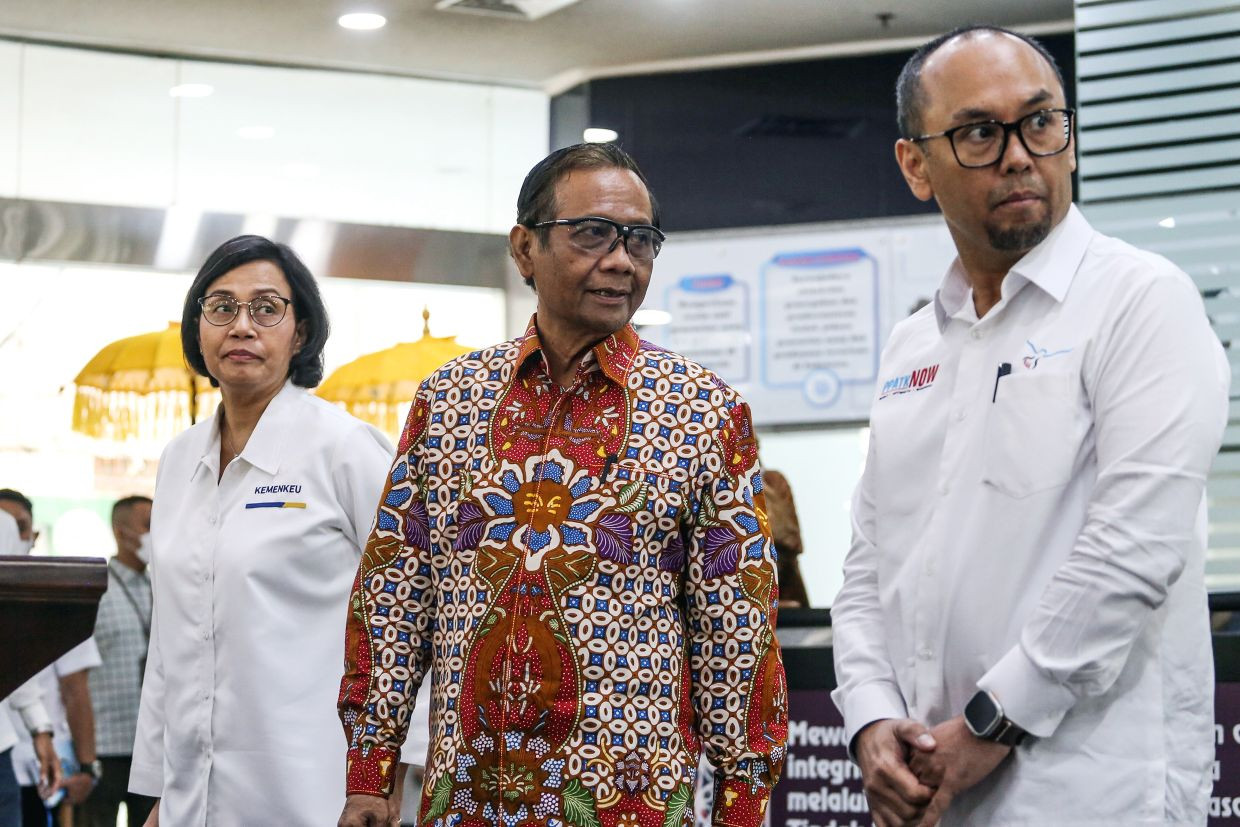Popular Reads
Top Results
Can't find what you're looking for?
View all search resultsPopular Reads
Top Results
Can't find what you're looking for?
View all search resultsTainted elections?
With the official elections watchdog appearing noncommittal about addressing the financial oversight agency’s findings, the onus is on law enforcement to prove Indonesians wrong in their growing distrust of the state apparatus.
Change text size
Gift Premium Articles
to Anyone
 Coordinating Political, Legal and Security Affairs Minister Mahfud MD (center), Finance Minister Sri Mulyani Indrawati (left) and Financial Transaction Reports and Analysis Center (PPATK) chairman Ivan Yustiavandana prepare to give a press statement at the PPATK headquarters in Jakarta on April 10, 2023. (Antara/Asprilla Dwi Adha)
Coordinating Political, Legal and Security Affairs Minister Mahfud MD (center), Finance Minister Sri Mulyani Indrawati (left) and Financial Transaction Reports and Analysis Center (PPATK) chairman Ivan Yustiavandana prepare to give a press statement at the PPATK headquarters in Jakarta on April 10, 2023. (Antara/Asprilla Dwi Adha)

Last week’s revelations from the Financial Transaction Reports and Analysis Center (PPATK) that illicit money could be flowing into campaigns for the 2024 general election should be taken very seriously, as they offer yet another reason to question the integrity of the upcoming polls.
On Friday, days after a heated first presidential debate, PPATK head Ivan Yustiavandana revealed that the agency had recorded a significant jump in suspicious transactions after the start of the campaign period on Nov. 28.
While we know that money always flows liberally in an election year, Ivan noted that the agency was convinced that at least some of the funds deposited into designated campaign accounts (RKDK) had originated from illicit sources, including illegal mining operations and misappropriated micro business loans.
If the allegations of illegal mining funds are true, environmental activists should be able to easily pin down the culprit from a limited pool of actors associated with the practice. If the micro loan embezzlement is true, it would be an unconscionable betrayal of the goodwill system used to lend to small business owners in actual need of financing.
The revelations have sparked fresh calls for an investigation into the PPATK’s findings, as rival camps point fingers at each other.
But the Elections Supervisory Agency (Bawaslu) said on Tuesday that it would treat the information as “preliminary” and that it would scrutinize candidates’ campaign finance reports due for filing on Jan. 7, 2024.

Unfortunately, this delay will likely give the offenders just enough time to cover their tracks – or at least stir up enough doubt for authorities to feel they can turn a blind eye.
Then there is the issue of the implicated parties. Bawaslu has denied the PPATK’s claims that the suspicious transactions can be linked back to certain electoral candidates and has challenged the information described in media reports.
Vote-buying was reportedly rampant in previous elections, but only a few perpetrators were brought to justice.
With the official elections watchdog appearing noncommittal about addressing the financial oversight agency’s findings, the onus is on law enforcement to prove Indonesians wrong in their growing distrust of the state apparatus.
Already, significant concerns have been raised about the country’s ability to pull off, fairly and transparently, one of the world’s biggest simultaneous elections.
The serious ethics breach that occurred in October in the halls of the nation’s top court, the Constitutional Court, has already given democracy activists enough reason to question the credibility of the election process. And the transgression by former chief justice Anwar Usman is enough to keep some voters away from a certain 2024 candidate pair.
Adding another dimension to the trust deficit at hand, a Corruption Eradication Commission (KPK) sting operation on Monday against Abdul Ghani Kasuba, the governor of North Maluku, has shown that transactional politics is still alive and kicking in the country, regardless of whether the man in question ends up being found guilty.
Prior to that, in November, the public contended with claims of voter roll information leaks, the latest in a string of privacy breaches over the past year that have largely targeted websites and databases of government bodies. The General Elections Commission (KPU) has insisted that the leak did not originate from it and says a police investigation is under way.
And this all is to say nothing of the whispers of attempts to rig the election.
The point, for us all, is that we cannot risk having an election that is tainted so many fronts, lest we come out on the other side in a very bad state.









